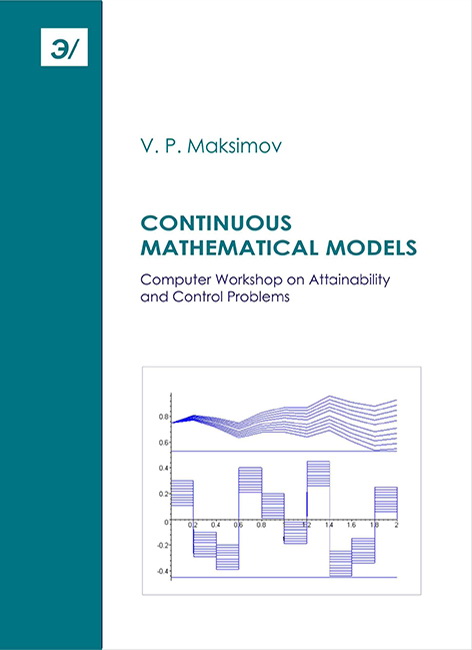
L международная выставка-презентация
научных, технических, учебно-методических и литературно-художественных изданий
Continuous Mathematical Models: Computer Workshop on Attainability and Control Problems

| Группа | Учебная литература |
|---|---|
| Область науки | Естественные науки |
| Название на русском языке | Continuous Mathematical Models: Computer Workshop on Attainability and Control Problems |
| Авторы на русском языке | Maksimov V.P. |
| Название на английском языке | Непрерывные математические модели: Компьютерный практикум по решению задач достижимости и управления |
| Авторы на английском языке | Максимов В.П. |
| Вид издания на русском языке | Учебное пособие |
| Издательство на русском языке | Perm, 2019. – 120 p. |
Резюме
This issue continues the series of manuals for students of the Economics Faculty, Perm State University in mathematical methods and models as applied to Economics and represents a collection of problems, covering the main classes of problems for continuous dynamic economic models. Some problems on the attainability of prescribed values of the on-target indexes, control problems with various class of controls, and optimal control problems with various objectives (minimum of expenditures, maximum of consumption and others) are among them. Problems formulations are followed by a discussion of the economic sense thereof, a brief description of principal facts from the control theory, and presentation of problem solving techniques and corresponding algorithms. The main attention is paid to realization of the algorithms by means of Computer Systems Maple, detailed instructions and possible development of the proposed tools. The material covers principal divisions of the courses Contemporary Mathematical Methods in Economics and Continuous Mathematical Models designed for students of Information Analytical Systems in Prediction and Control of Socioeconomic Development (IASPCSD) and Master in Mathematical Methods in Economics and Finance (MMIEF) master programs in the field of «Applied Mathematics and Computer Science» (Id. # 01.04.02).
The teaching experience shows that the theoretical part of the above mentioned courses presented in the previous manuals is quite difficult for the students in Economy and requires special methodical issues devoted to computer-assisted techniques and aimed at i) the study of the problems under consideration in the great diversity of their parameters, ii) interpretation of the arising situations, iii) experience of successful use of the computer experiment under the study of various control problems.
The Computer Workshop represents a complex of theoretical and methodical materials that includes the following:
– description of the problems under study with examples of real-world economic-mathematical problems;
– mathematical formulation of the problems in a general form which allows one to propose a unified approach to the research;
– discussion of actual variants of the most practical interest;
– description of proposed techniques for the study and solution of the problems;
– detailed step-by-step description of the algorithms;
– necessary information about Computer System Maple as a main tool of algorithms realization;
– collection of the solved problems with detailed instructions, comments and interpretation of the obtained results;
– detailed comments to the Maple codes;
– reach collection of the problems for independent study;
– description of frequently arising situations that are difficult-to-solve under independent algorithms realization;
– list of answers and notes to the problems proposed for independent study.
The textbook consists of four parts: theoretical one with elements of the theory, practical with examples of computer assisted study, collection of the problems for independent study, and answers to all variants of those. Each part is divided into numbered sections, some of which are divided into numbered subsections. The way of numeration is natural, for example, 2.3.1 is the number of the first subsection from the third section of the second part. In Part 2, the steps of algorithms are numbered successively and independently on the section number. In the frame of each section all formulae are numbered independently; once we cite those outside of the current section, the number of the addressed section is indicated (e.g., system (10) of Section 1.3).

МЕДАЛЬ «ЗА ВЕРНОСТЬ ТРАДИЦИЯМ ОТЕЧЕСТВЕННОГО ОБРАЗОВАНИЯ» С УДОСТОВЕРЕНИЕМ